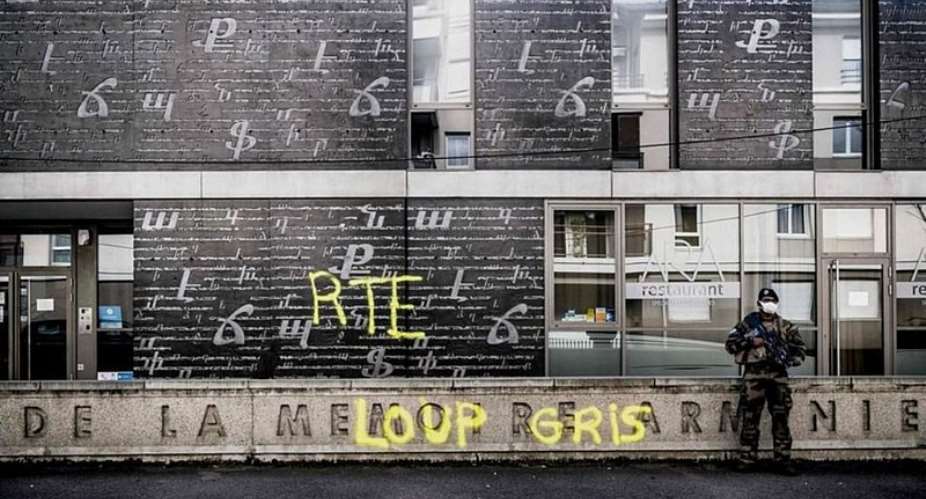France's government said Wednesday it had disbanded the Grey Wolves, a Turkish ultra-nationalist group linked with incidents targeting the Armenian community around the city of Lyon. The ban comes at a time of heightened tension between France and Turkey.
French Interior Minister Gérald Darmanin announced the decision after consulting government colleagues.
“The 'Grey Wolves' (Loup Gris) movement has been disbanded in a cabinet meeting, as requested by the President of the Republic,” Darmanin said on social media, attaching a copy of the executive order for the ban.
“As detailed in the decree that I presented, it [the group] incites discrimination and hatred and is implicated in violent actions”.
The French government stepped up action against the group after its name was found scrawled in bright yellow graffiti on a defaced Armenian memorial centre near Lyon at the weekend.
“The National Armenian Memorial Centre and the monument dedicated to victims of the genocide of Armenians were defaced in the night,” tweeted Franck Papazian, president of the Coordinating Council of Armenian Organisations in France.
Many Armenians have lobbied in France and elsewhere for governments to recognize mass killings of Armenians during World War One to have been part of a Turkish campaign of ethnic cleansing.
The Grey Wolves were also linked clashes that wounded four people around Lyon in late October as Armenians rallied in support of Nagorno Karabakh, a contensted region of Turkey ally Azerbaijan controlled by Armenian separatists since the 1990s.
Franco-Turkish tensions
The Grey Wolves are connected with a political party allied to that of Turkish President Recep Tayyip Erdogan, who has been locked in a feud with French President Emmanuel Macron over a range of geostrategic and diplomatic issues.
Macron has thrown France's weight behind opposition to Turkish oil prospecting in territorial waters of European Union members Greece and Cyprus in the eastern Mediterranean Sea.
Last week, Erdogan accused Macron of leading a campaign against Islam after the French president defended the right of publishers to print satirical cartoons depicting the Prophet Mohammed.
The Turkish president also threatened to sue France over his own depiction on a cover of satirical magazine Charlie Hebdo.
Latest in series of bans
The French government has been making use of security laws allowing it ban groups it considers to pose a threat to public order, namely targeting groups earmarked for Islamist radicalisation even before recent deadly attacks.
Following the beheading of schoolteacher Samuel Paty, cabinet ministers banned an organisation operated by Abdelhakim Sefrioui, a salafist on a watch list for radicalisation who provided support to father who led an online campaign against the teacher.
Islamic NGO BarakaCity was also banned, and the government will soon consider whether to disband the Collective Against Islamophobia in France, a self-described human rights group that has worked in partnership with left-wing parties.
Far-right group Génération Identitaire is also on a list of some 50 groups being considered for bans.
There was some doubt about how the ban of the Grey Wolves would work, as the group has no legal status in France.
Nicolas Lebourg, a political scientist who studies violent groups, told French media disbanding groups was not necessarily the best way to fight radicalisation.
“Police and intelligence services often consider that debanding a group is not necessarily the best idea, arguing that they can monitor what group members do and where they go, and do not wish to scatter them,” Lebourg told newspaper La Croix.





 List of 24 ministerial nominees approved by Parliament
List of 24 ministerial nominees approved by Parliament
 You were my inspiration, made me who I am today – Lilian Kumah
You were my inspiration, made me who I am today – Lilian Kumah
 Rainstorm destroys Hohoe E.P. Senior High School building
Rainstorm destroys Hohoe E.P. Senior High School building
 John Kumah strongly supported me to become NPP flagbearer – Bawumia reveals
John Kumah strongly supported me to become NPP flagbearer – Bawumia reveals
 Late John Kumah urged me to run for NPP flagbearer, strongly supported me — Bawu...
Late John Kumah urged me to run for NPP flagbearer, strongly supported me — Bawu...
 Akufo-Addo appoints Joseph Kpemka as Deputy MD of BOST
Akufo-Addo appoints Joseph Kpemka as Deputy MD of BOST
 Ablakwa petitions CHRAJ to investigate sale of SSNIT's hotels to Rock City Hotel
Ablakwa petitions CHRAJ to investigate sale of SSNIT's hotels to Rock City Hotel
 MoF to provide new bailout for defunct Gold Coast Fund investors – Bawumia revea...
MoF to provide new bailout for defunct Gold Coast Fund investors – Bawumia revea...
 OMCs implement price adjustments despite International petroleum price declines
OMCs implement price adjustments despite International petroleum price declines
 Petition to remove Kissi Agyebeng will disrupt operations of OSP – Martin Kpebu
Petition to remove Kissi Agyebeng will disrupt operations of OSP – Martin Kpebu
